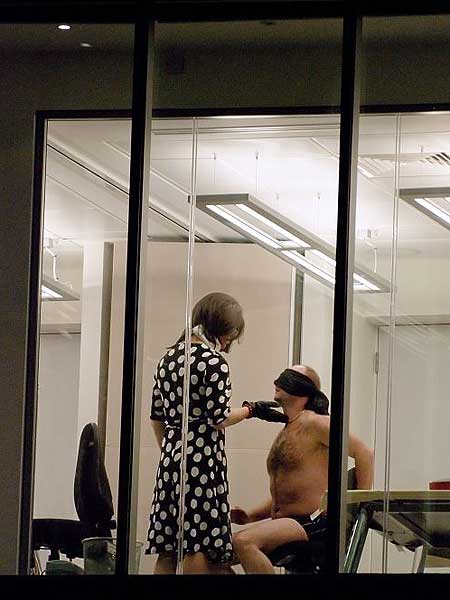Thomas Sutcliffe: A lost window of opportunity

Very hazardous things, rhetorical questions – best avoided in political speeches, as any stump politician will know, because some cocky sod will almost invariably fill in the answer before you can, and it's usually not the one you want. But I don't much care for them in art either, since they provoke that rather curmudgeonly part of me which is always wondering whether I've been sold a pup. Why are you asking me, I think, you're the writer.
Last week, I encountered two excellent examples towards the end of Shunt Theatre's ingenious new show at the Lyric Hammersmith, Contains Violence. I quote from memory – so I can't be entirely sure that I've got the thing down word perfect – but at one point one of the participants turns to the assembled audience and asks: "Am I giant panda... am I salmon stuffed with roe?" And hearing these questions, after around an hour of slowly mounting bemusement and flagging interest, I found myself wondering why on earth the author hadn't worked that out for himself before he started charging people for admission.
The ingenuity of the show, incidentally, lies in the fact that it's staged in an office block facing the Lyric's external terrace. Audience members are issued with a tight-fitting pair of radio headphones and a pair of binoculars and seated in the open air, with a view of Hammersmith roundabout down the road and – directly across the way – a selection box of lighted windows. The compere/giant panda explains how to use the equipment and, without any obtrusive curtain-up, the show itself begins.
In one window you can see a young woman in a polka-dot dress and a neck brace ineffectually trying to secure party balloons to the walls. In another, a stressed-out young man transcribes the resignation letter he's dictated on to a tape recorder. And you hear the sound effects for their actions with a hallucinatory clarity, since they've been recorded through a binaural microphone that effectively places your head inside the room, even though the rest of you is outside it, a hundred yards away.
The technology works very well – and, although I'm irredeemably conservative about such enterprises, I think you'd have to be unusually high-minded not to get a little buzz of pleasure from the potential of the set-up. It is promising, not just because you can't be entirely sure where the next tableau will be revealed – and so find yourself peering at every window with voyeuristic scrutiny – but also because something genuinely happens to the suspension of your disbelief. Maybe it isn't as high-minded as that. Maybe it's just a little jolt of novelty for the jaded theatre-goer. But I found myself anticipating what was to come with more than usual curiosity.
Unfortunately, the promise wasn't kept. It slowly became clear that, while the basic set-up owed quite a lot to Hitchcock's Rear Window, the narrative of Contains Violence wasn't going to go for anything as straightforward as a thriller plot but instead meander at will through a kind of prose poem about career anomie. The woman appeared to be making obscene and threatening telephone calls, the man appeared to be on the verge of a nervous breakdown – but the possibility that the things they were doing might be embedded in a realistic narrative faded pretty quickly. After a while, the audience realised that anything could happen, and because anything could there wasn't much point in getting worked up about what actually did.
To put it another way, for all the talk about pushing boundaries and challenging preconceptions that usually accompanies such work, those who'd made it had opted for the least challenging approach. It was experimental all right, but it was an experiment without any kind of control, some fixed measure which would allow you to see what the variable – the oddity of the staging – actually added.
To be fair, it would have been quite difficult coming up with a narrative that worked in these circumstances, but deciding not to bother at all was altogether too easy – a retreat to that baggy inconsequentiality to which avant-garde theatre so often resorts. The tricky business of constructing a dramatic mechanism in which the cogs connect and the levers do real work is left to other, more vulgar, forms of theatre. And this is a cop-out, because what it means is that any creative shortfall in the construction can be forgivingly hidden away inside a vapour of ambiguity. It isn't incoherent because something is missing, runs the argument, it's incoherent because coherence itself is suspect. It was a pity, because the prospect of spying on a play rather than just watching it was genuinely interesting. Perhaps they could try again for a production of The Importance of Being Earnest.
Join our commenting forum
Join thought-provoking conversations, follow other Independent readers and see their replies
0Comments